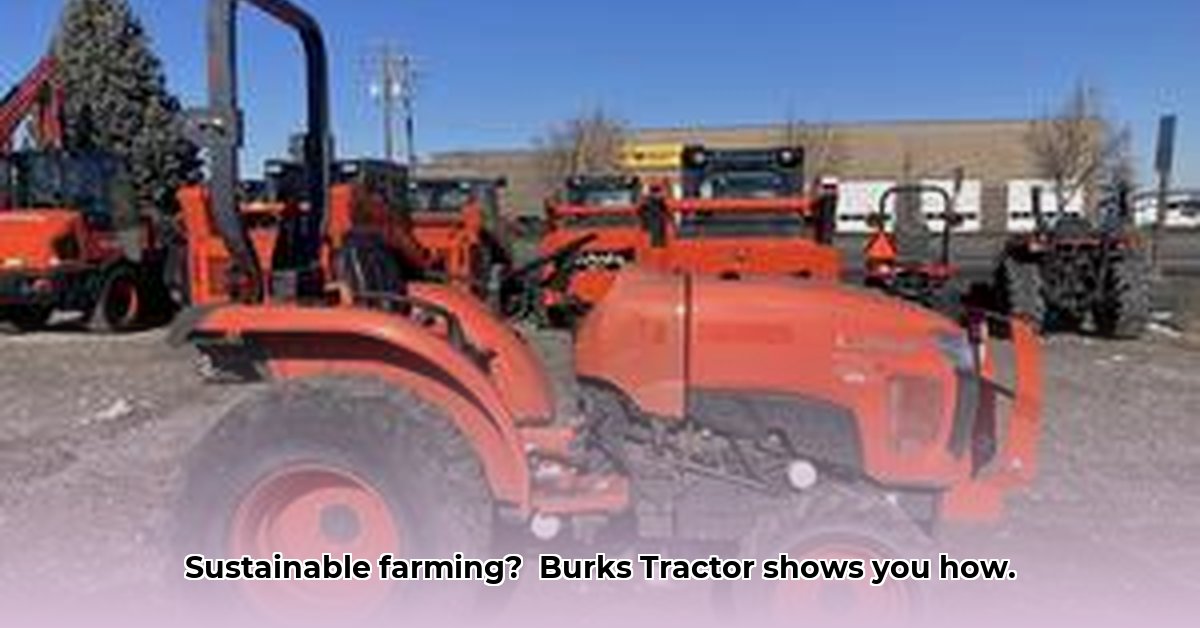
Burks Tractor Twin Falls: A Deep Dive into Sustainable Ag Equipment
Idaho's agricultural landscape is undergoing a significant transformation towards sustainable practices. Central to this shift is the equipment used by farmers, and Burks Tractor in Twin Falls plays a pivotal role. This in-depth analysis examines Burks Tractor's equipment offerings, their influence on sustainable agriculture, and identifies opportunities for improvement. We’ll analyze their market position, equipment choices, and suggest actionable steps for Burks, farmers, and policymakers to foster a more sustainable future for Idaho agriculture. For more information on Burks Tractor, visit their website: Burks Tractor.
Burks Tractor Twin Falls: Market Position and Sustainable Ag
Burks Tractor enjoys a strong presence in the Idaho agricultural equipment market. Their established network, encompassing multiple locations and partnerships with major brands like Kubota and Case IH, provides them with significant reach. This market dominance translates to considerable influence on farming practices within the region. However, a critical question remains: how effectively does Burks Tractor promote and support the adoption of sustainable agricultural technologies? Their current focus largely centers on conventional equipment; while this reliability serves existing farmers, it doesn’t fully address the growing demand for innovative, environmentally friendly solutions. How can Burks leverage its established network to drive sustainability initiatives in Idaho agriculture?
Equipment Offerings: Balancing Tradition and Transformation
Burks Tractor's primary offerings consist of conventional agricultural machinery. While this reliability is crucial for many farmers, the question arises: to what extent does their inventory incorporate innovative, sustainable technologies? The availability of precision farming tools like GPS-guided tractors and smart fertilizer spreaders is key. Furthermore, the presence of equipment designed to minimize soil compaction and improve water usage is crucial for long-term sustainability. A comprehensive analysis comparing the fuel efficiency and emissions of Burks' equipment (both new and used) against competitors would provide valuable insights. This comparison, presented visually, would highlight potential areas for improvement and opportunities for leadership in sustainable equipment provision. Does Burks offer renewable energy integration, such as solar-powered irrigation systems? This data-driven approach is essential for evaluating their overall contribution to sustainable agriculture.
Sustainability Gaps and Growth Opportunities
At present, Burks Tractor's contribution to sustainable agriculture could be significantly enhanced. While their service to existing farmers is valuable, the opportunity to promote forward-thinking, eco-friendly solutions is substantial. Partnering with companies specializing in sustainable agricultural technologies would represent a substantial step forward. Proactive strategies like workshops on sustainable farming practices and resource provision for farmers transitioning to greener methods would significantly impact Idaho's agricultural sustainability. Expanding their product lines to include more energy-efficient and environmentally conscious equipment is crucial.
Case Studies: Farmer Perspectives
Farmer A (John Miller, Owner, Miller Family Farms): "Burks has always been reliable for parts and prompt repairs. Minimizing downtime is crucial for sustainability—it reduces wasted resources and keeps my operation running smoothly."
Farmer B (Sarah Chen, Owner, Chen Orchards): "I'm interested in no-till farming but finding suitable equipment is challenging. Burks excels with my current needs, but a broader range of sustainable options would be invaluable."
These contrasting perspectives highlight the need for Burks to actively support the transition to more sustainable practices. Further case studies showcasing farmers' experiences with specific sustainable technologies would add depth to this analysis.
Actionable Recommendations: A Collaborative Approach
Significant progress requires a collaborative effort from all stakeholders. The following outlines actionable short-term (0-1 year) and long-term (3-5 years) recommendations:
| Stakeholder | Short-Term Actions | Long-Term Actions |
|---|---|---|
| Burks Tractor Twin Falls | Conduct a comprehensive fuel efficiency audit across their entire inventory; initiate partnerships with sustainable technology providers. | Develop a dedicated sustainability program, including staff training and farmer educational resources; actively promote and stock eco-friendly equipment. |
| Idaho Farmers | Evaluate current equipment's energy efficiency; explore funding opportunities for sustainable upgrades. | Adopt sustainable farming methods, utilizing updated technologies and equipment; participate in educational initiatives. |
| Idaho Gov't/Agencies | Increase funding for research and development in sustainable agricultural technologies; launch educational campaigns. | Implement incentive programs to encourage the adoption of sustainable farming practices; Invest in infrastructure to support renewable energy use in farming. |
Conclusion: Shaping the Future of Idaho Agriculture
Burks Tractor holds substantial potential to influence the trajectory of sustainable agriculture in Idaho. Their success hinges not solely on equipment sales, but on fostering a thriving, environmentally responsible farming community. By investing in employee training, expanding their sustainable equipment offerings, and collaborating with farmers and government agencies, Burks can play a pivotal role in shaping a sustainable future for Idaho's agricultural landscape.